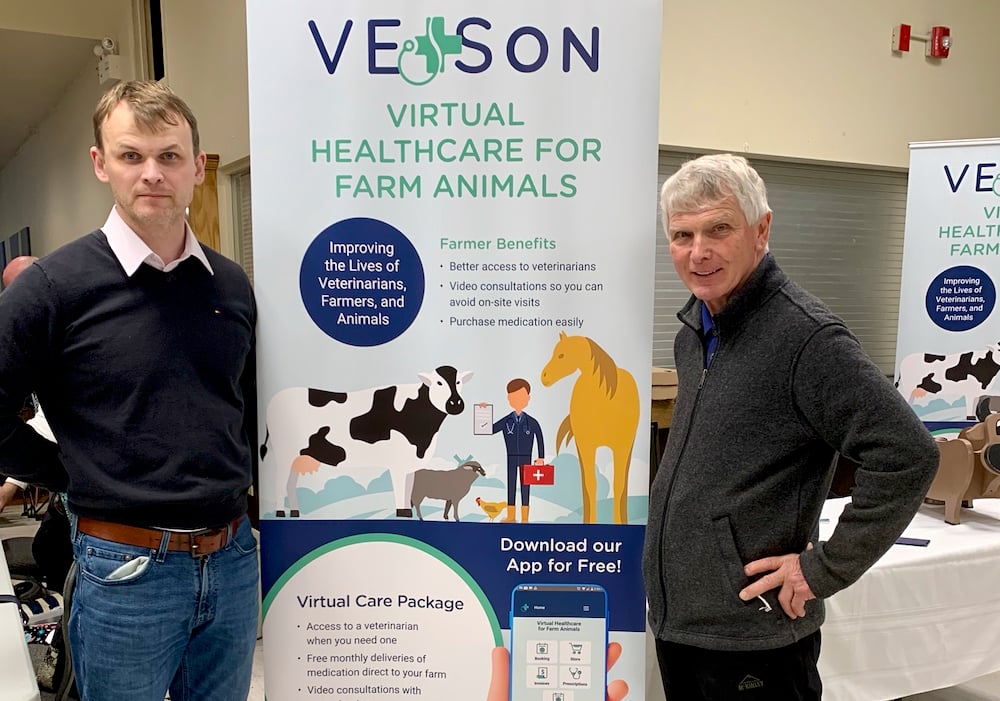Digital medicine gives farmers easier access to veterinary care

Canada has a growing nation-wide shortage of veterinarians, particularly in rural and remote areas. An Ontario start-up has launched a solution aimed to lessen the burden on struggling veterinary practices and make services available to more farmers.
Read Also


Making efficient use of all that farm data
Launch of the first GPS yield monitors altered the world of on-farm data collection. That was followed by variable-rate technology,…
Colin Yates and his father, Glen, who has been a mixed practice veterinarian for more than 45 years, have launched VETSon, an artificial intelligence-powered virtual healthcare platform designed to let veterinarians service more clients and give more animal owners access to care.
Why it matters: The shortage of food animal veterinarians, particularly in rural and remote areas, is limiting growth in the agri-food sector and creating concern over how Canada would handle a major animal health emergency.
Veterinary shortages were a problem before COVID-19 and intensified through the pandemic, which also saw a marked rise in pet ownership and increased demand for veterinary care.
“I grew up watching the challenges in the veterinary industry, especially with the growing shortage of vets in rural areas, so we’ve developed a tool to help veterinary practices cover as many calls as efficiently as possible,” says Yates.
This includes an e-commerce tool, for example, where farmers can order livestock medicine directly from their clinic through the app and the product is delivered to the farm. This increases convenience for the farmer, who doesn’t have to work around clinic office hours, and saves the vet from additional paperwork or drop-off on the farm.
Vet clinics sign on to the VETSon service and provide clients with a login. Farmers can then access their veterinarian’s practice digitally, including through telemedicine visits and virtual locum services to fill temporary gaps.
Revenue is shared between VETSon and the veterinary practice; there is no change in pricing for farmers if a clinic is using the service, says Yates.
“What is new is that they can be paying for a video instead of in-person visit.”
The first practice trialed was his dad’s practice, Slant Road Mobile Veterinary Services, which serves clients from Kapuskasing to Ottawa to Windsor.
Yates provides strategic support and helps developers understand the veterinary industry’s needs, with the goal of having technology that is easy for vets and farmers to use.
Response from farmers has been “overwhelming”, with farms from northern British Columbia to Cape Breton trying to access the remote service. VETSon can only help if farmers have a licensed practice partner in that jurisdiction, and the company is actively pursuing expansion across Canada to meet demand.
“We are a revenue generating company now and we are starting to get traction with clinics. It’s a conservative industry but we’ve made a conscious effort to work with the College of Veterinarians of Ontario and other regulatory bodies in Canada to give them updates,” Yates says.
“We aren’t trying to work around vet clinics. We are about supporting veterinarians.”
VETSon is also turning heads in the innovation space. It is a graduate of Creative Destruction Lab’s supply chain stream startup program in Montreal and a member of the current cohort of ag-tech startups at Cultivator, an innovation hub based in Saskatchewan led by Conexus Credit Union.
VETSon has also been part of the RH Accelerator in London since 2022; the RH-affiliated 519 Growth Fund was an early investor.
“When you’re a startup, it’s all about networking on various levels. These programs help you gain information to educate yourself on how to raise money and practice pitching. That’s an art in itself,” says Yates. “Potential investors can help us scale faster; this is a global issue.”
Most recently, VETSon presented to the European Union’s Working Party of Chief Veterinary Officers, who asked the company to share how it uses telemedicine to ease veterinary strain.
In two years, the company hopes to have an established footprint across Canada and a global presence in five years.
Source: Farmtario.com

